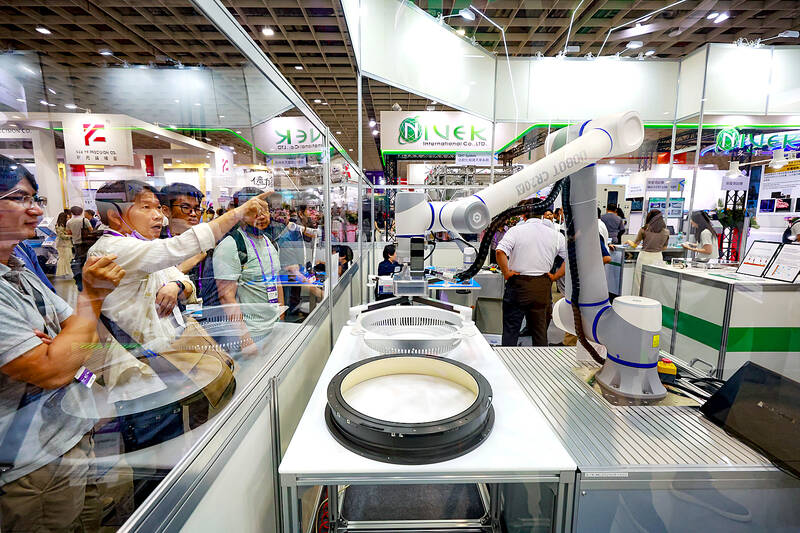The nation’s industrial production index rose 14.41 percent year-on-year to 117.36 last month, boosted by strong artificial intelligence (AI) demand and front-loading of new consumer electronics, the Ministry of Economic Affairs said yesterday.
The manufacturing production index, which comprises 94.63 percent of the industrial production index, increased 15.48 percent year-on-year to 118.22, the ministry said.
The increase in the manufacturing production index was the 18th consecutive month of growth and exceeded the ministry’s forecast of 112.19 to 116.19, Department of Statistics Deputy Director-General Chen Yu-fang (陳玉芳) told a news conference in Taipei.

Photo: Ritchie B. Tongo, EPA
In the first eight months of this year, the industrial and manufacturing production indices rose 16.59 percent and 17.75 percent from a year earlier respectively, the ministry said.
The manufacturing production index this month is expected to rise 15 to 19 percent year-on-year, supported by sustained demand for high-performance computing and front-loading of consumer electronics, Chen said.
The index this quarter is forecast to increase 16.8 to 18.2 percent from a year earlier and could hit a record high this year, Chen said.
However, growth momentum in the remaining months of this year depends on sustained demand for advanced semiconductors and AI-related products, and is related to weakness in traditional industries and global economic uncertainty, she said.
The latest report showed electronic component production last month rose 31.52 percent, supported by new smartphone launches in the US, South Korea and China, while semiconductor output expanded 35.86 percent on the back of AI-driven demand for wafer design and production, Chen said.
Production of computers, electronic goods and optical components grew 3.8 percent last month, supported by AI and cloud service demand, but growth slowed sharply from July, as server makers entered a product transition phase, she said.
Flat panel and related component output fell 1.58 percent, as declines in large TV panels continued to offset growth in medium and small-sized panels, she added.
The data also showed persistent weakness in traditional industries, as manufacturers remained affected by global geopolitical fluctuations, the ministry said.
Base metal production, mainly steel, fell 0.69 percent, while chemical materials and fertilizers dropped 1.71 percent amid oversupply and low-price competition from China, Chen said.
Base metal production, including plumbing hardware and screw suppliers, was hit by US tariffs as clients turned conservative, while manufacturers said they have yet to see the effect of China’s new policy requiring domestic steel producers to cut supply this month, she said.
Vehicle output dropped 11.95 percent, as demand for auto components, particularly in the US and European markets, remained weak, she said.
Machinery equipment production fell 1.24 percent, ending 10 straight months of growth, due to a higher base last year and weak order momentum for makers, including machine tool suppliers, amid US tariff uncertainties, Chen said.

RECYCLE: Taiwan would aid manufacturers in refining rare earths from discarded appliances, which would fit the nation’s circular economy goals, minister Kung said Taiwan would work with the US and Japan on a proposed cooperation initiative in response to Beijing’s newly announced rare earth export curbs, Minister of Economic Affairs Kung Ming-hsin (龔明鑫) said yesterday. China last week announced new restrictions requiring companies to obtain export licenses if their products contain more than 0.1 percent of Chinese-origin rare earths by value. US Secretary of the Treasury Scott Bessent on Wednesday responded by saying that Beijing was “unreliable” in its rare earths exports, adding that the US would “neither be commanded, nor controlled” by China, several media outlets reported. Japanese Minister of Finance Katsunobu Kato yesterday also

Jensen Huang (黃仁勳), founder and CEO of US-based artificial intelligence chip designer Nvidia Corp and Taiwan Semiconductor Manufacturing Co (TSMC, 台積電) on Friday celebrated the first Nvidia Blackwell wafer produced on US soil. Huang visited TSMC’s advanced wafer fab in the US state of Arizona and joined the Taiwanese chipmaker’s executives to witness the efforts to “build the infrastructure that powers the world’s AI factories, right here in America,” Nvidia said in a statement. At the event, Huang joined Y.L. Wang (王英郎), vice president of operations at TSMC, in signing their names on the Blackwell wafer to

‘DRAMATIC AND POSITIVE’: AI growth would be better than it previously forecast and would stay robust even if the Chinese market became inaccessible for customers, it said Taiwan Semiconductor Manufacturing Co (TSMC, 台積電) yesterday raised its full-year revenue growth outlook after posting record profit for last quarter, despite growing market concern about an artificial intelligence (AI) bubble. The company said it expects revenue to expand about 35 percent year-on-year, driven mainly by faster-than-expected demand for leading-edge chips for AI applications. The world’s biggest contract chipmaker in July projected that revenue this year would expand about 30 percent in US dollar terms. The company also slightly hiked its capital expenditure for this year to US$40 billion to US$42 billion, compared with US$38 billion to US$42 billion it set previously. “AI demand actually

RARE EARTHS: The call between the US Treasury Secretary and his Chinese counterpart came as Washington sought to rally G7 partners in response to China’s export controls China and the US on Saturday agreed to conduct another round of trade negotiations in the coming week, as the world’s two biggest economies seek to avoid another damaging tit-for-tat tariff battle. Beijing last week announced sweeping controls on the critical rare earths industry, prompting US President Donald Trump to threaten 100 percent tariffs on imports from China in retaliation. Trump had also threatened to cancel his expected meeting with Chinese President Xi Jinping (習近平) in South Korea later this month on the sidelines of the APEC summit. In the latest indication of efforts to resolve their dispute, Chinese state media reported that